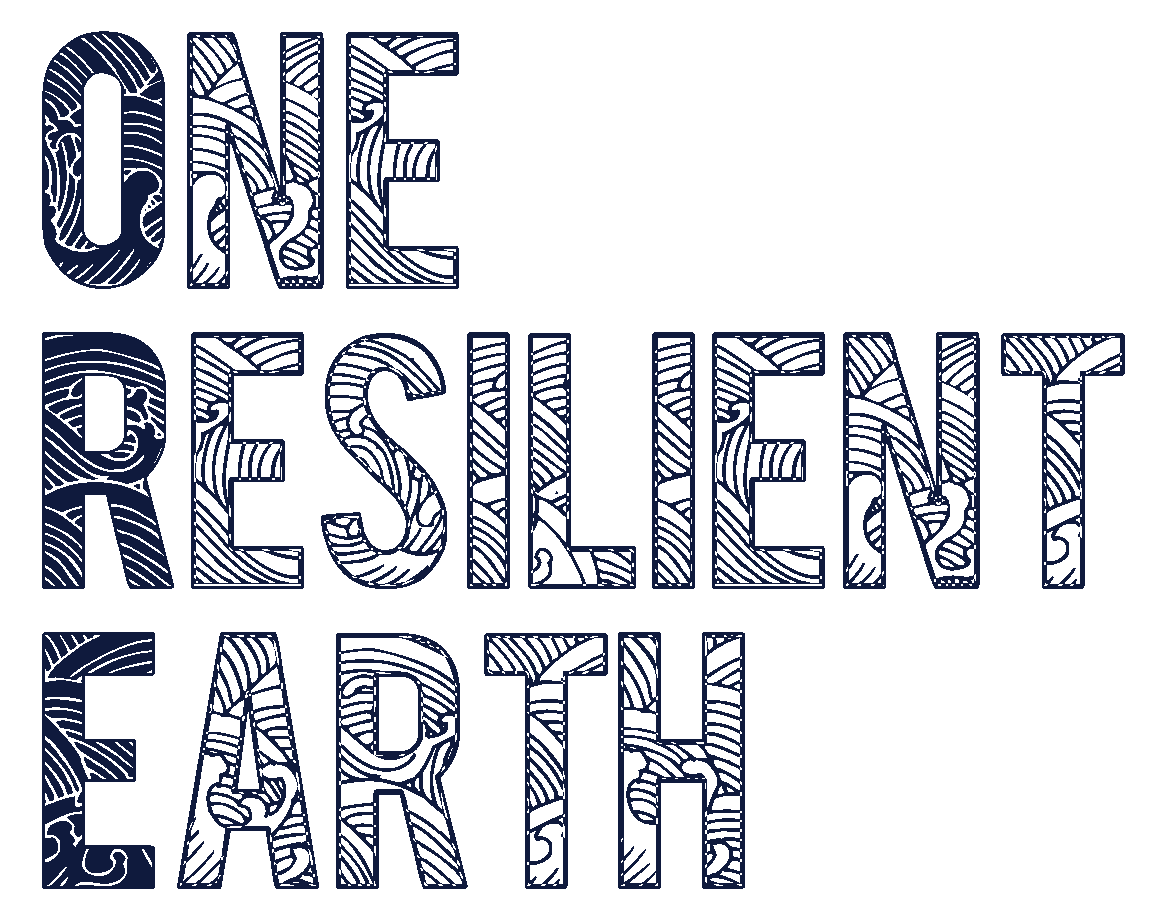The Open Mind Series is a selection of interviews with artists, designers and other ‘creators’ from around the world giving us an insight into how they see the world now and tomorrow. No qualifications required. No taboo. No right or wrong. Just openness. And artworks.
Has theatre helped you cope with the climate crisis? Or has it made it worse for you?
As an autoethnographic writer, theatre has helped me cope with, or rather contextualise the key material events of my life, be they personal or political, that have served to reframe the perception of self, and nation, within the world.
Wales is, as all tourists complain, wet. Water has a totemic significance in Wales. The forced damming of the Tryweryn river by the English city of Liverpool in the 1960s – against the wishes of the Welsh politicians and the Welsh people – reawoke the desire for self-determination within the Welsh. Forty years on, it arguably led directly to devolution. Yet, despite its own government, Wales is arguably still Othered by England and there is a danger in that.
Regarding the creation of Water Wars, I had no pre-determined desire to deal with the climate crisis per se. However, a seemingly innocuous conversation had one night in a bar – recounted verbatim in the text – proved to be ‘evental’ (in that it activated a reframing). Eben, a member of the Welsh eco-force talks to his wife:
‘I was chatting to this English guy in a bar, and I said to him, ‘Look, even fifty years ago, at the turn of the millennium, your country had less water per head than Afghanistan; less than Somalia, or Syria![…] Your government knew this, but they said nothing, did nothing. They just presumed that water would flow as if devolution never happened.’ […] ‘But Wales is drowning in water,’ he said and I said, ‘Yeah.’ ‘So what you saying?’ he said; looking me straight in the eyes. ‘You own the fucking rain?’’
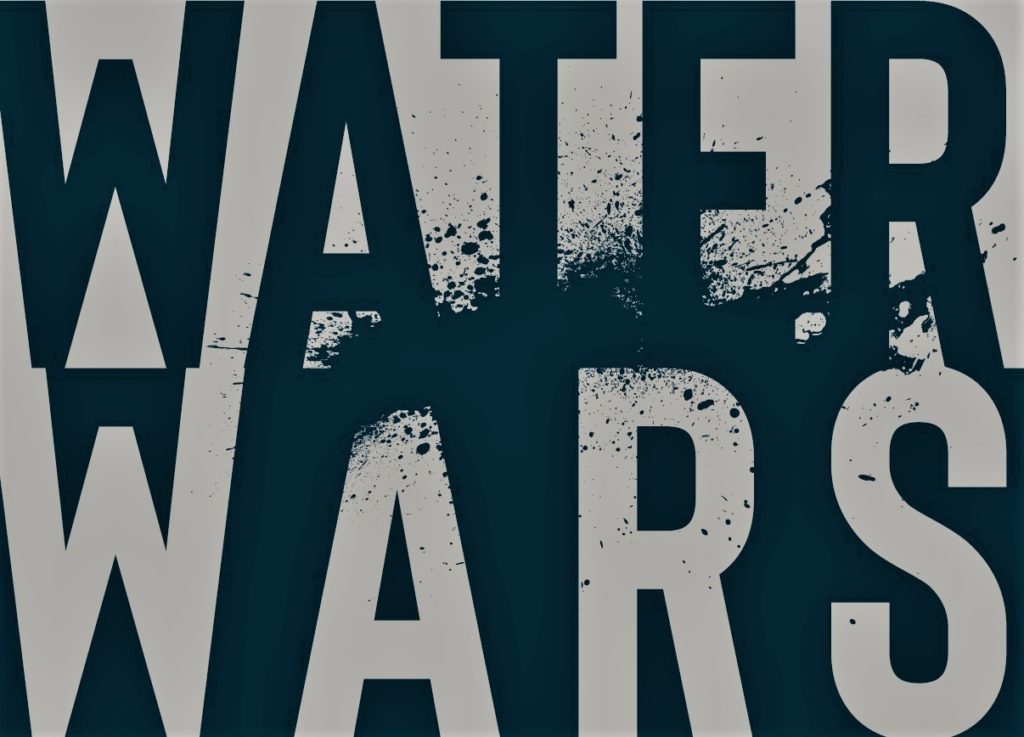
Around that experiential event, inspirations gradually accrued: in particular, two books and a newspaper article served to throw the subject into relief and force the text into existence as a means to ‘cope’ with (consider) the ownership of rain – the one resource that Wales is both cursed and blessed with – in an ecologically stressed future.
Fred Pearce in When the Rivers Run Dry informs us that even at the turn of the millennium, ‘south east England had less water per head than Ethiopia, Syria and Somalia.’ London, Pearce further informs us, is an ecologically unviable city. Indeed, Boris Johnson, whilst the Mayor of London, and no doubt, knowing this, in a newspaper article called for a British network of water pipes in order to hydrate the south east of England and in particular, its unsustainable capital: and that, no doubt heedless of the devolved settlements.
In Water Wars, England invades Wales in order to appropriate its resources in order sustain its own ecology. There is the historic precedent, Wales lays claim to being the first industrialised nation, yet little of the wealth that was generated from iron, coal, slate and copper remained in Wales. Steven A. Leblanc in Constant Battles: Why We Fight – the second book to inspire Water Wars – informs us that all wars have been, are and will be, wars for resources. Eco-conflict around the world will only worsen as the crisis deepens. It is to be expected that countries such as England will fight to maintain their dominance and integrity despite their growing unviability as they exceed their ‘carrying capacities’ thereby repeating the patterns of imperial colonialisation.
Being, one could argue, an unfashionably political dramatist, Water Wars arises out of my desire to challenge the given ‘consensus’ that Britain is still Great and unified: an untruth that could endanger the sustainability of the ecologies of the new centres, located in the historic margins, as the historic centre attempts to consolidate its position during any possible acceleration of the climate crisis.

What do you hope to leave the audience with?
Contra the pedagogic nature of theatre, that both the dramatic and post-dramatic forms perpetuate, I would not deign to present answers, for I possess none. I only hope to leave the audience with their thoughts regarding the questions I ask of myself and am at a loss to answer.
In addition to being an eco-thriller, Water Wars is an exercise in post-colonial discourse: not that I am, for an instant, claiming that Wales is a post-colonial entity that has suffered in the way that colonised peoples have suffered over the past several hundred years. The Welsh benefitted from British imperialism. However, they were also subject to the negation of identity through psycho-colonialism and subjugation through Capitalism resulting in the formation of a ‘characteristic series of sub-national deformities, or neuroses,’ as Tom Nairn termed them in the Break-up of Britain. As stated Wales has been, and continues to be Othered. If the planet is to be saved, historic Othering must be challenged and new ways of living in relation to and with Others must be found. It is here that the intersectionality between post-colonial and ecological discourse (and all anti-hegemonic discourses) lies.
In a key speech in the play, Eben, a member of the Welsh eco-force, whilst interrogating his captured English counterpart, states:
‘Human history, [is] one long drawn out eco-conflict. And that’s why you’re here, isn’t it. You want our water because your eco-system’s fucked; from the Midlands south, your water table is so low, you’re sucking the glass dry with a straw; and it’s an ugly sound. And we feel sorry for you, we do. But we are tired of being screwed over for your desires, English. Our water sustains our own needs. Without it, our own ability to survive diminishes. Now, we were willing to trade resources, weren’t we? Willing to trade. But you chose to fucking invade us instead; as if, in a past age, you were putting down Wogs in Calcutta or Micks in Drogheda, your hubris is, beyond fucking words! What makes you think that we would willingly thirst to death, so that you can water the green lawns of Surbiton? Eh? If you can’t afford to water your lawns, don’t fucking plant them and certainly don’t invade other ecologies to fucking water them!
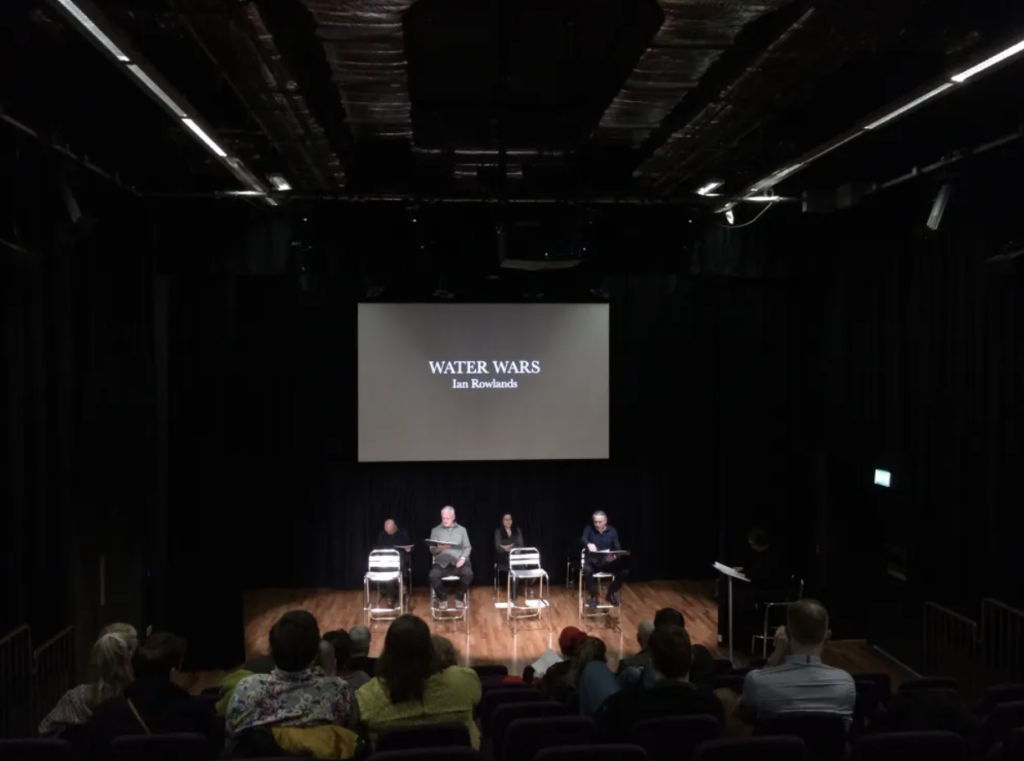
Whom do you wish could see your plays/performances today?
Having endured countless zoom meetings / performances / presentations etc over the past year and an half, I cannot emphasize how much I loathe digital interaction. I cannot bear to watch another theatre piece shoehorned into the virtual. I crave the live. For it is only in the live event that communal dreaming can take place. The full production of Water Wars, was, as stated, postponed a week into rehearsals owing to the Covid crisis. Whilst it has since been published and a socially distanced rehearsed reading was filmed and made available on the web, it is a production – one amongst thousands the world over – held in the anterior future: suspended, awaiting an audience. The make up of that audience is not mine to determine, my only hope of their quality is that they are live and alive to the possibility of life and respectful of the lives of others.
If there was no limit to what you could do, which story would you like to tell? Where would it be staged and with which protagonists?
I believe it is Fredric Jameson who said (and I paraphrase). ‘It is easier for us to imagine the death of the World that the death of Capitalism.’ My story would demand the ultimate in imagination and would be performed everywhere by communities enacting their living principles.
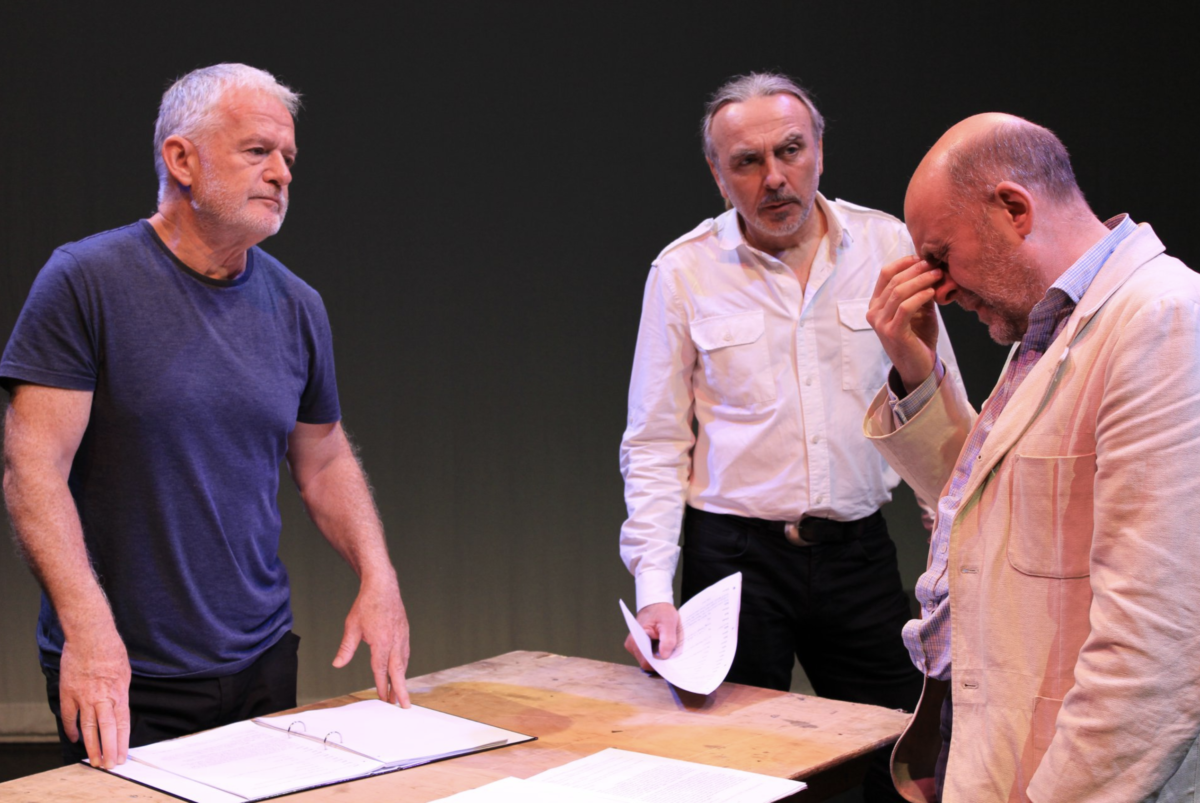
Do you have practices to make your work less wasteful and/or more sustainable?
I work a lot in television, and much of the administrative work that was achieved face to face can now be achieved virtually. However, the creative pre-production elements – rehearsals – are weakened when conducted online. The spark only occurs when actors are face to face on the floor. It is the same with theatre, performance demands presence. Only then can dissensual spaces come into being; places of magic within which possibilities can be envisaged.
I am aware that a paper, The Green Theatre (produced by the Greater London Authority, 2008) estimated that the London theatres combined produced 50,000 tonnes of CO2 per year. Let us multiply that figure for the whole of Britain tenfold and estimate that theatre in Britain (when curtains raise once again upon its stages) will generate 500,000 tonnes of CO2 per year. It is estimated that Bitcoin currently generates between 22 and 23 million metric tonnes of CO2 per year and the tonnage, we are informed, will increase. Theatre is a communal event that has the potential to change lives and communities for the good. Bitcoin is the virtual embodiment of Capital, it is heedless of the communal good.
Theatre practitioners squeeze their meagre budgets – recycle materials, calculate the carbon footprint of tours etc – in order to create sustainable practice knowing that each and every tonnes of CO2 is a saving. We are all responsible for the climate crisis, but eco-guilt placed upon the shoulders of individuals that try their best to seek sustainability and change the world for the good, is an handy scape goat for those that accelerate towards the end point of the crisis without a care in the world. Capital is the elephant in the room. Why do we not call it out? It is the Capital that has created the climate crisis. It is as seductive as it is destructive. Theatre can and should present an alternative reality to Capitalist Realism in the most sustainable way possible. It needs presence in order to achieve that and that will obviously incur the production of CO2. I guess it’s a matter of degrees and priorities.
What inspires you the most in nature/in this world?
My daughter’s favourite place in the world is Garn Goch, an Iron Age fort that lies on a mountain that rises in the Towy (pronounced, Tow-ee) valley in south west Wales. High above the valley the fort offers a three sixty degree horizon – ideally defensible. When I walk within the walls of that fort, tumbledown yet existent, I am aware of the permanence of nature and the fleeting time we are granted to exist within its realm. On summer afternoons, one can experience brief moments of bliss only for them to be destroyed by the sound of motorcycles aggressively speeding down the valley roads: predominantly driven by small men battling against the limits of their existences. And, in those moments when a fragile bliss is destroyed, standing next to my daughter, I despair at the accelerated rate at which nature is despoiled by so called progress and false freedoms.
What do you like to celebrate with your community?
Its historical dissentism. Wales is a community of communities that celebrates its difference. In celebrating that difference, we must also respect the differences of others. It is that, that has historically marked us out as different to the Other that has derided our difference and sought only our deference. My devolutionary texts are warnings, that with freedom we do not replicate the logic of deference. The argument belongs to Bhabha, I guess.
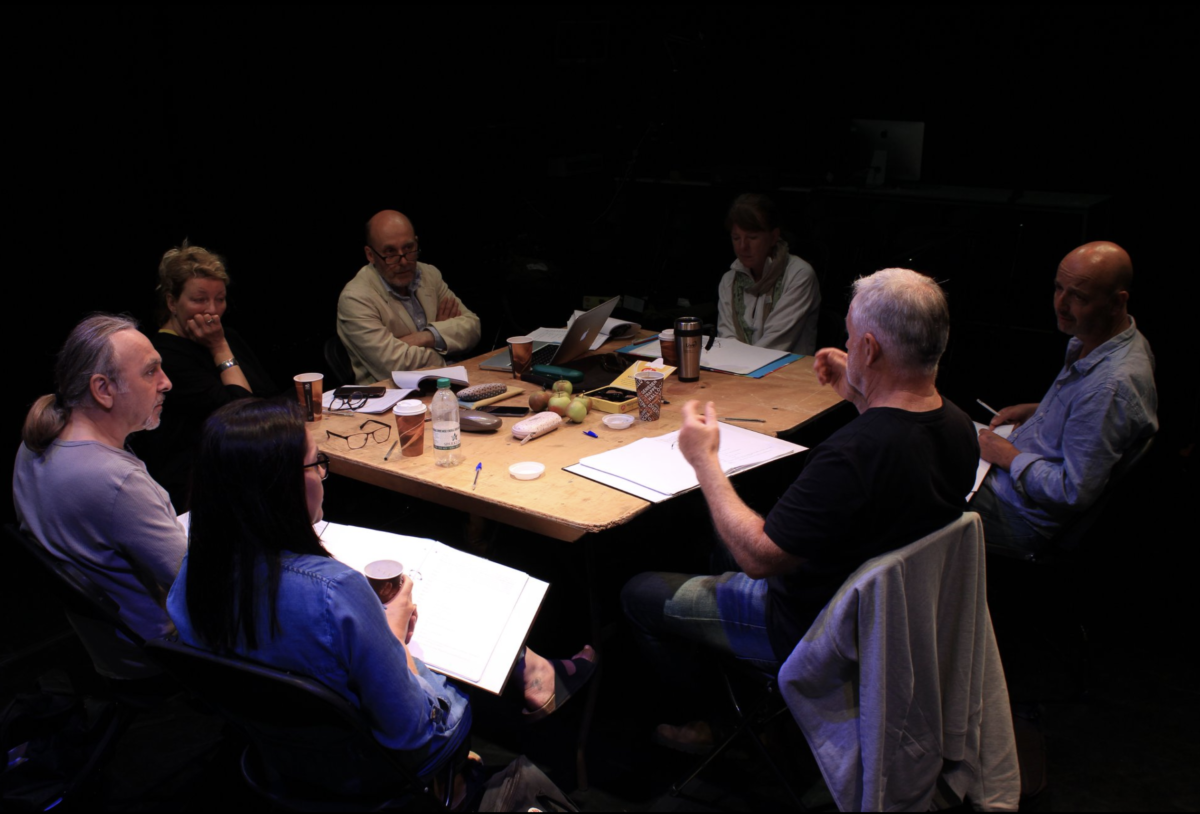
Because this is our favourite question, how do you imagine the world in 1000 years?
I dare not imagine it. For when I do, I see replication. The non-conformist Welsh liked to call their nation ‘Gwlad y Menig Gwynion’ [the country of the white gloves]: as in, by being a protestant god-fearing nation, the Welsh were / are a people beyond reproach: as most peoples believe themselves to be, witness American and British exceptionalism. In a wonderful novel by Islwyn Ffowc Ellis, one of Wales’s most celebrated writers, Y Blaned Dirion (trans. The Fair Planet: published in 1968, adapted for BBC Radio Cymru by this author), a Texas billionaire of Welsh descent finances a Welsh space mission to an utopian planet. The Welsh land upon it and immediately begin to pervert and destabilise it with their human mores and base nature. Humans are rapine, the Welsh are no different: gloves on or off. If we are to imagine the world in 1,000 years, we must accept that a revolution of a frightening order must inevitably take place if humans are to survive. As a father, such a prospect petrifies me. As a theatre maker, I can merely contribute to the revolution of mind that must take place in order to dream of and enact a better future: one that will hopefully not destroy entirely before it arises anew.
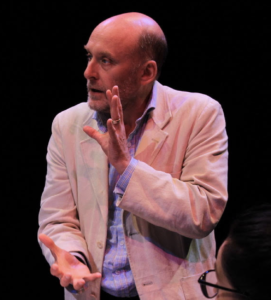
Ian Rowlands is a freelance writer and director who works in theatre, radio and television in his native Wales. Much of his theatre work is a response to devolution. Devolution has been termed a ‘process’, and it is the ‘process’ that much of his theatre work charts.
